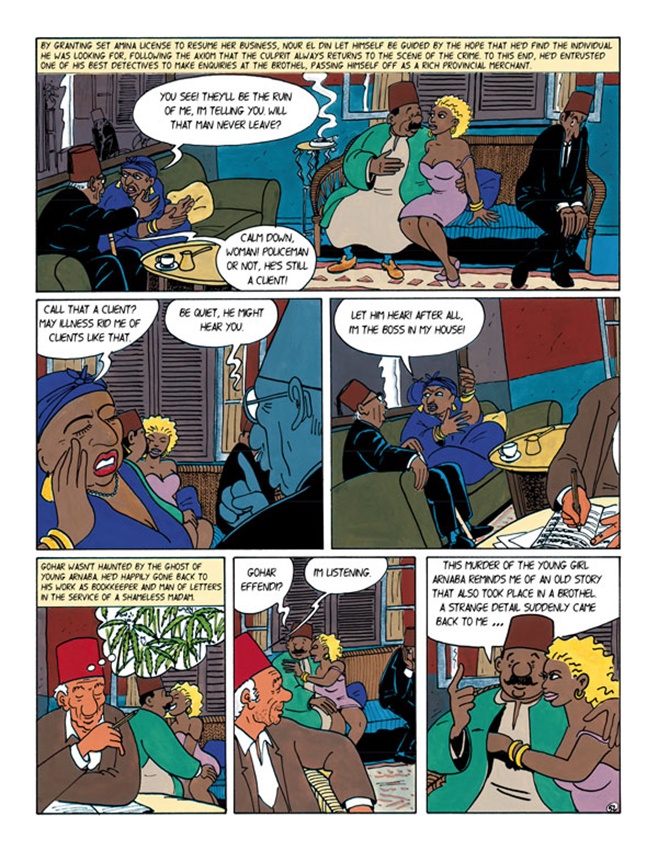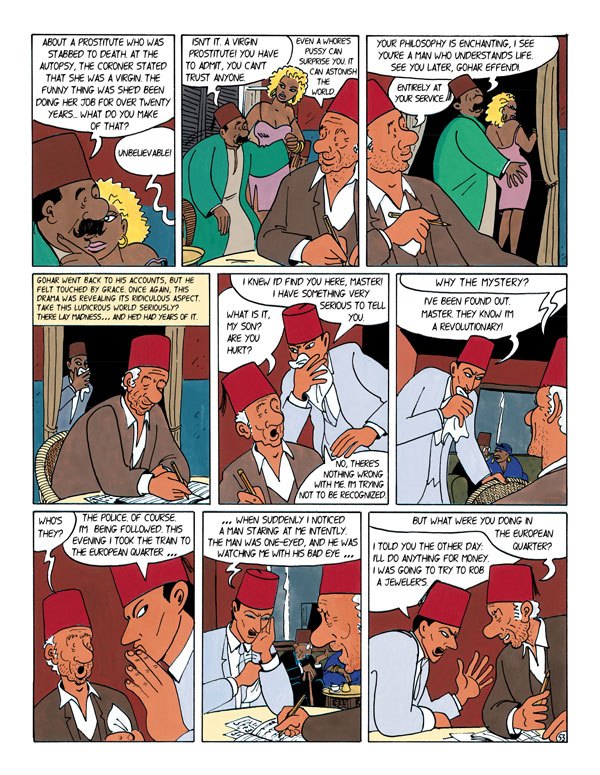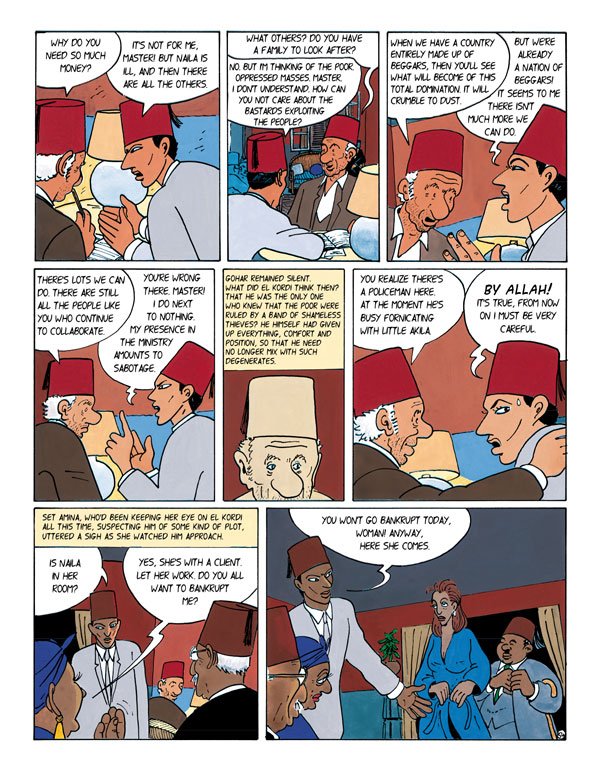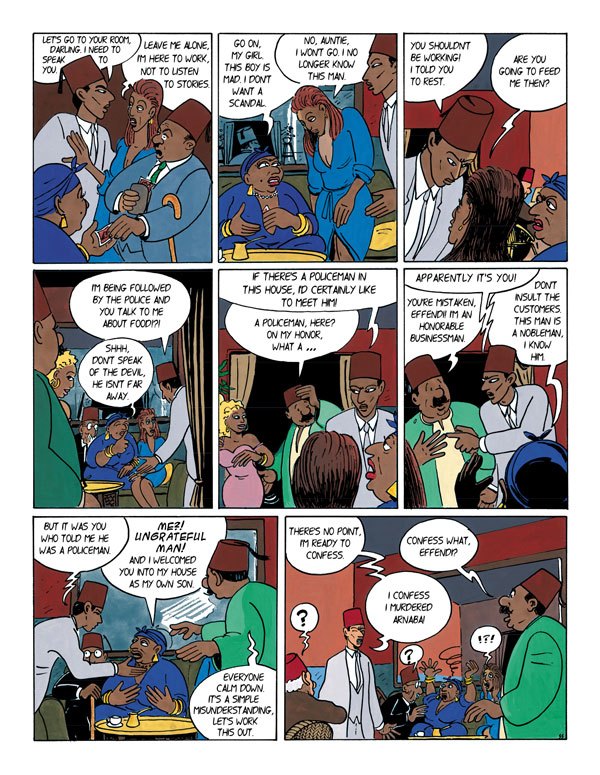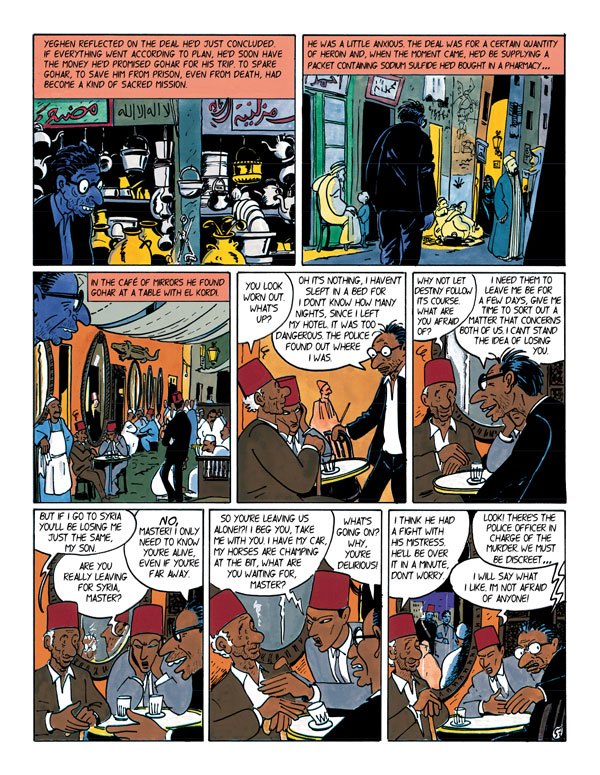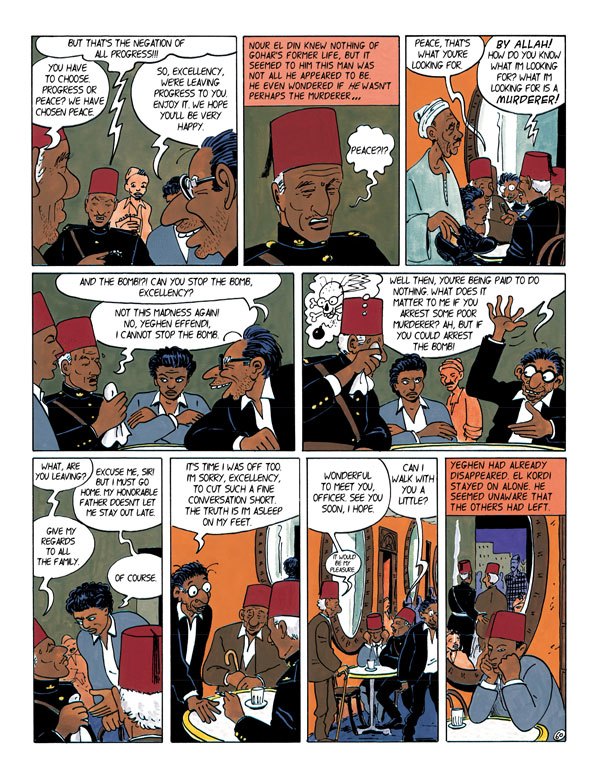Captions: [By granting Set Amina license to resume her business, Nour El Din let himself be guided by the hope that he’d find the individual he was looking for, following the axiom that the culprit always returns to the scene of the crime. To this end, he’d entrusted one of his best detectives to make enquiries at the brothel, passing himself off as a rich provincial merchant.] Set Amina: You see! They’ll be the ruin of me, I’m telling you. Will that man never leave? Man: Calm down, woman! Policeman or not, he’s still a client! Set Amina: Call that a client? May illness rid me of clients like that. Man: Be quiet, he might hear you. Set Amina: Let him hear! After all, I’m the boss in my house! [Gohar wasn’t haunted by the ghost of young Arnaba. He’d happily gone back to his work as bookkeeper and man of letters in the service of a shameless madam.] Detective/Merchant: Gohar Effendi? Gohar: I’m listening. Detective/Merchant: This murder of the young girl Arnaba reminds me of an old story that also took place in a brothel. A strange detail suddenly came back to me…
Captions: Detective/Merchant: About a prostitute who was stabbed to death. At the autopsy, the coroner stated that she was a virgin. The funny thing was she’d been doing her job for over twenty years...What do you make of that? Gohar: Unbelievable! Detective/Merchant: Isn’t it. A virgin prostitute! You have to admit, you can’t trust anyone. Gohar: Even a whore’s pussy can surprise you. It can astonish the world. Detective/Merchant: Your philosophy is enchanting, I see you’re a man who understands life. See you later, Gohar Effendi. Gohar: Entirely at your service. [Gohar went back to his accounts, but he felt touched by grace. Once again, this drama was revealing its ridiculous aspect. Take this ludicrous world seriously? There lay madness…and he’d had years of it.] El Kordi: I knew you’d be here, master! I have something very serious to tell you. Gohar: What is it, my son? Are you hurt? El Kordi: No, there’s nothing wrong with me. I’m trying not to be recognized. Gohar: Why the mystery? El Kordi: I’ve been found out. Master, they know I’m a revolutionary! Gohar: Who’s they? El Kordi: The police of course. I’m being followed. This evening I took the train to the European Quarter… El Kordi: …When suddenly I noticed a man staring at me intently. The man was one-eyed, and he was watching me with his bad eye… Gohar: But what were you doing in the European Quarter? El Kordi: I told you the other day. I’ll do anything for money. I was going to try to rob a jewelers.
Captions: Gohar: Why do you need so much money? El Kordi: It’s not for me, master! But Naila is ill, and then there are all the others. Gohar: What others? Do you have a family to look after? El Kordi: No. But I’m thinking of the poor, oppressed masses, Master. I don’t understand, how can you not care about the bastards exploiting these people? Gohar: When we have a country entirely made up of beggars, then you’ll see what will become of this total domination. It will crumble to dust. El Kordi: But we’re already a nation of beggars! It seems to me there isn’t much more we can do. Gohar: There’s lots we can do. There are still all the people like you who continue to collaborate. El Kordi: You’re wrong these, master! I do next to nothing. My presence in the ministry amounts to sabotage. [Gohar remained silent. What did El Kordi think then? That he was the only one who knew that the poor were ruled by a band of shameless thieves? He himself had given up everything, comfort and position, so that need no longer mix with such degenerates.] Gohar: You realize there’s a policeman here. At the moment he’s busy fornicating with little Akila. El Kordi: By Allah! It’s true, from now on I must be very careful. [Set Amina, who’d been keeping her eye on El Kordi all this time, suspecting him of some kind of plot, uttered a sigh as she watched him approach.] El Kordi: Is Naila in her room? Set Amina: Yes, she’s with a client. Let her work. Do you all want to bankrupt me? El Kordi: You won’t go bankrupt today, woman! Anyway, here she comes.
Captions: El Kordi: Let’s go to your room, darling. I need to speak to you. Naila: Leave me alone. I’m here to work, not listen to stories. Set Amina: Go on, my girl. This boy is mad. I don’t want a scandal. Naila: No, auntie, I won’t go. I no longer know this man. El Kordi: You shouldn’t be working! I told you to rest. Naila: Are you going to feed me then? El Kordi: I’m being followed by the police and you talk to me about food!?! Set Amina: Shhh, don’t speak of the devil, he isn’t far away. El Kordi: If there’s a policeman in this house, I’d certainly like to meet him! Detective/Merchant: A policeman, here? On my honor, what a… El Kordi: Apparently it’s you! Detective/Merchant: You’re mistaken, Effendi! I’m an honorable businessman. El Kordi: Don’t insult the customers. This man is a nobleman, I know him. El Kordi: But it was you who told me he was a policeman. Set Amina: Me?! Ungrateful man! And I welcomed you into my house as my own son. Detective/Merchant: Everyone calm down. It’s a simple misunderstanding. Let’s work this out. El Kordi: There’s no point, I’m ready to confess. Detective/Merchant: Confess what, Effendi? El Kordi: I confess I murdered Arnaba! Gohar: ? : ? Naila: !?!
Captions: Perfume seller: A single drop of this perfume and men will die for you. Woman: I don’t to kill anyone, I just want to make my husband happy. Perfume seller: Then I won’t sell it to you! I feel sorry for him, he’ll go mad at the very least. Woman: What a day! Why say such silly things? I’ll take it. Perfume seller: All right. For you, it’s only ten piastres. Woman: Ten piastres! By allah you’re ruining me! I’m the one who’s going mad!?! Perfume seller: You’ll see, you’ll be eternally grateful to me, your husband will never reject you. He’ll be unable to exist far from this perfume… Woman: He only needs to come here and get some. Perfume seller: By the prophet, I won’t sell him any. Perfume seller: …It’s a deal then, the price is ok. I’ll take it. Yeghen: I’ll bring it as quickly as I can. I’m not sure when. They’ll be handing it over soon. Perfume seller: I hope it’s good quality?!? Yeghen: The best! You know I’m an expert. Good-bye!
Captions: [Yeghen reflected on the deal he’d just concluded. If everything went according to plan, he’d soon have the money he’d promised Gohar for his trip. To spare Gohar, to save him from prison, even from death, had become a kind of sacred mission.] [He was a little anxious. The deal was for a certain quantity of heroin and, when the moment came, he’d be supplying a packet containing sodium sulfide he’d bought in a pharmacy…] [In the café of mirrors he found Gohar at a table with El Kordi.] Gohar: You look worn out. What’s up? Yeghen: Oh it’s nothing, I haven’t slept in a bed for I don’t know how many nights, since I left my hotel, it was too dangerous. The police found out where I was. Gohar: Why not let destiny follow its course. What are you afraid of? Yeghen: I need them to leave me be for a few days. Give me time to sort out a matter that concerns both of us. I can’t stand the idea of losing you. Gohar: But if I go to Syria you’ll be losing me just the same, my son. El Kordi: Are you really leaving for Syria, master? Yeghen: No, master! I only need to know you’re alive, even if you’re far away. El Kordi: So you’re leaving us alone!?! I beg you, take me with you. I have my car, my horses are champing at the bit. What are you waiting for, master? Yeghen: What’s going on? Why, you’re delirious! Gohar: I think he had a fight with his mistress. He’ll be over it in a minute, don’t worry. Yeghen: Look! There’s the police officer in charge of the murder. We must be discreet…. El Kordi: I will say what I like. I’m not afraid of anyone!
Captions: Yeghen: Good evening, officer. Please honor us with your company. Nour El Din: What a happy surprise. I’d be charmed to know your friends… but I believe I’ve already had the pleasure of meeting this young man. El Kordi: Well, I’m really flattered that you remember, Excellency. Nour El Din: How could I forget? I never forget an intelligent man. Let me introduce Samr, a young relative of mine. Yeghen: And this is Gohar Effendi, Excellency. How is it you don’t yet know Gohar Effendi? It’s a serious gap in your life! Gohar: A gap I’d be glad to fill… Yeghen: So, officer, is the enquiry progressing? Nour El Din: I’m not unhappy, the case is close to being solved. Nour El Din: A worrying story reached my ears, El Kordi Effendi. It appears you boasted of murdering Arnaba, in front of witnesses. Is that true? El Kordi: It is true, you were not deceived, and I retract nothing. What are you waiting for to arrest me? Yeghen: I had no idea, my dear El Kordi, well done. Nour El Din: I will not arrest you, because I know that you are not the murderer. You just wanted to boast. Why? I don’t understand it…Can you explain his conduct, Gohar Effendi? I think you were present at this ridiculous scene!?! Yeghen: Officer, wait, go on, Master, tell us your thoughts. Gohar: Well, I think I can explain my young friend’s behavior. El Kordi is a man with a very noble soul. He’d like to change the world, but isn’t sure ho to go about it. I think he was revolted by this crime. He wanted to take responsibility for it and offer himself as a martyr to the cause he believes in.
Captions: El Kordi: Master! This is intolerable! I admit I’m not the murderer, but what does it matter whether it was me or someone else? El Kordi: What matters to you, officer, is to arrest someone, no? Nour El Din: That’s absurd! Utterly absurd. It’s not that at all. I want to arrest the guilty man and no one else. Gohar: Innocent and guilty, it must be hard to choose. Nour El Din: But I’m not choosing. I only arrest a man when I’m convinced of his guilt. You’re all educated people here and yet you seem to have no idea of the law! Yeghen: It’s not law that interests us, but man! Why a man like you, instead of enjoying his brief life, should spend his time arresting his fellow men. It does seem an unhealthy occupation. {Music and singing from radio} Nour El Din: But I’m simply defending society against criminals. What kind of people are you? you’re living outside of reality. Gohar: The reality you’re talking about is one made up of prejudice. It’s a nightmare invented by men. Nour El Din: There aren’t two realities?!? Gohar: There are! First, there’s the reality born of trickery and deception, where you’re thrashing about like a fish caught in a net. The other is a smiling reality, reflecting the simplicity of life. What does a man need to live? A bit of bread is enough. Yeghen: A bit of hashish too, master! Gohar: All right, my son, a bit of hashish too!
Captions: Nour El Din: But that’s the negation of all progress! Gohar: You have to choose progress or peace? We have chosen peace. Yeghen: So, Excellency, we’re leaving progress to you. Enjoy it. We hope you’ll be happy. [Nour El Din knew nothing of Gohar’s former life, but it seemed to him this man was not all he appeared to be. He even wondered if he wasn’t perhaps the murderer…] Nour El Din: Peace?!? Gohar: Peace, that’s what you’re looking for. Nour El Din: By Allah! How do you know what I’m looking for? What I’m looking for is a murderer! Yeghen: And the bomb!?! Can you stop the bomb, Excellency? Nour El Din: Not this madness again! No, Yeghen Effendi, I cannot stop the bomb. Yeghen: Well then, you’re being paid to do nothing. What does it matter to me if you arrest some poor murderer? Ah, but if you could arrest the bomb! Nour El Din: What, are you leaving? Samr: Excuse me, sir! But I must go home. My honorable father doesn’t let me stay out late. Nour El Din: Give my regards to all the family. Samr: Of course. Yeghen: It’s time I was off too. I’m sorry, Excellency, to cut such a fine conversation short. The truth is I’m asleep on my feet. Gohar: Wonderful to meet you, Officer. See you soon, I hope. Nour El Din: Can I walk with you a little? Gohar: It would be my pleasure. [Yeghen had already disappeared. El Kordi stayed on alone. He seemed unaware that the others had left.]







